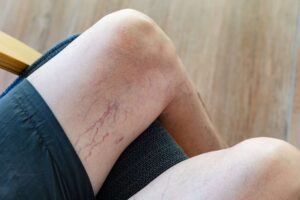Sclerotherapy is a trusted, minimally invasive treatment for varicose veins, helping many people achieve relief from discomfort and improve the appearance of their legs. However, it’s not the best option for everyone. Your unique health history, vein condition, and treatment goals all play a role in determining the right approach. At Miami Vein Institute, we’re here to guide
you through your options and help you find the most effective vein solution for your needs. If sclerotherapy isn’t the best fit, there are other treatments that may work better for you. Schedule a consultation with us today to explore the best path to healthier veins!
Dealing with varicose veins can be frustrating, especially when they cause discomfort or affect your confidence. If you are considering treatment options, sclerotherapy is a popular, non-surgical solution that helps many people achieve smoother, healthier-looking legs. But is it the right choice for you?
Certain factors can affect whether sclerotherapy is the best option, and understanding them can help you make an informed decision about your vein health. Let’s explore when this treatment may not be the best fit and what alternative solutions might work better for you.
What is Sclerotherapy?
Sclerotherapy involves injecting a special solution into the affected veins, causing them to collapse and eventually fade away. This minimally invasive treatment is commonly used for smaller varicose veins and spider veins. It’s a quick procedure with minimal downtime, making it an attractive option for many people.
While sclerotherapy is effective for most patients, there are certain conditions and factors that could make it less suitable. Here are some of the reasons why you might not be a candidate for sclerotherapy:
When Sclerotherapy Might Not Be Right for You
- Severe Varicose Veins or Deep Vein Disease
Sclerotherapy is generally most effective for treating smaller varicose veins and spider veins that are closer to the surface of the skin. If your veins are large, deep, or more complex, this treatment may not be able to fully address the problem. In such cases, treatments like Endovenous Laser Treatment (EVLT) might be a better option, as it targets deeper veins more effectively. - Active Blood Clots or History of Deep Vein Thrombosis (DVT)
If you have a history of blood clots, particularly Deep Vein Thrombosis (DVT), sclerotherapy may not be recommended. The procedure involves injecting a solution into the veins, which can sometimes increase the risk of dislodging a clot. In such cases, your doctor will assess your medical history and recommend alternative treatments that are safer for you. - Pregnancy – Pregnancy is a time of significant changes in your body, and treatments like sclerotherapy are not recommended during this period. Hormonal fluctuations, increased blood volume, and the physical demands of pregnancy can all affect the veins, and varicose veins that develop during pregnancy may resolve after childbirth. If you are pregnant or planning to become pregnant, it’s best to wait until after delivery before considering sclerotherapy.
- Active Skin Conditions or Infections Near the Treatment Area
Sclerotherapy is not recommended if you have an active skin infection, rash, or other skin conditions near the veins that are being treated. Skin infections or conditions like eczema or dermatitis can make it more difficult for the treatment to work effectively. If you have concerns about skin health or existing conditions, it’s important to discuss them with your vein specialist before scheduling a procedure. - Poor Overall Health or Blood Flow Issues
If you have certain underlying health conditions that affect your ability to heal, or if you have circulatory disorders that prevent adequate blood flow, sclerotherapy might not be the right treatment. Your doctor will review your medical history and evaluate your overall health to ensure that this treatment is safe for you. - Allergic Reactions to Sclerotherapy Solution
Though rare, some people may experience allergic reactions to the sclerotherapy solution. If you’ve had an allergic reaction to similar treatments in the past, it’s essential to let your doctor know. They may recommend an alternative treatment that’s better suited to your needs.
When to Seek Treatment
Even if you’re not a candidate for sclerotherapy, there are a variety of other treatment options available for varicose veins. Our team will work with you to find the best solution for your individual needs.
If you’re experiencing symptoms like pain, swelling, or visible veins, it’s important to seek a consultation with a vein specialist who can assess your situation and provide you with personalized care.
What Other Treatment Options Are Available?
If sclerotherapy is not suitable for you, you might want to consider:
VenaCure Endovenous Laser Treatment (EVLT):A minimally invasive procedure designed to treat larger and more complex varicose veins. This advanced technique uses targeted laser energy to heat and close off problematic veins, effectively rerouting blood flow to healthier veins. The procedure is performed under local anesthesia, and patients typically experience minimal downtime.
Schedule Your Consultation Today at Miami Vein Institute in Coral Gables and Weston, FL
At Miami Vein Institute, we specialize in personalized care for all of your vein health needs. Our team of experts will evaluate your condition and recommend the most effective treatment options based on your unique situation. We offer a range of non-surgical and minimally invasive treatments designed to restore your health and enhance your appearance.
If you’re not sure whether sclerotherapy is right for you, don’t worry—we’ll help you explore all of your options. Schedule a consultation with us today, and let’s work together to find the treatment that best suits your needs!
Frequently Asked Questions (FAQ)
- Is sclerotherapy safe?
Yes, sclerotherapy is generally a safe and effective treatment for smaller varicose veins and spider veins. However, not everyone is a candidate, and it’s important to consult with a vein specialist to determine if it’s right for you. - Can I get sclerotherapy if I’m pregnant?
Sclerotherapy is not recommended during pregnancy. It’s best to wait until after childbirth before considering vein treatments. - How long does it take to see results? Results can vary, but most patients start to see improvement within a few weeks after treatment. Full results can take a few months as the veins gradually fade.
- Can I resume normal activities after sclerotherapy?
You can typically return to normal activities right away, although it’s recommended to avoid strenuous exercise for a few days after treatment. - Are there any side effects of sclerotherapy?
Side effects are generally mild and may include temporary bruising, swelling, or redness at the injection site. Serious side effects are rare but can occur, which is why it’s essential to work with an experienced vein specialist.

John W. Dr. Chang, MD, serves as the Partner and Medical Director at Miami Vein Institute, a premier center specializing in vein treatment in South Florida. With a focus on providing high-quality care and ensuring patient safety and satisfaction, Dr. Chang has helped establish Miami Vein Institute as a leading destination for minimally invasive vein treatments. At Miami Vein Institute, Dr. Chang offers a comprehensive range of minimally invasive procedures, including Endovenous Laser Treatments (EVLT) and Sclerotherapy, to address various vein-related concerns. His expertise in both general and cosmetic surgery, combined with specialized training in vein treatments, allows him to tailor treatment plans to meet each patient’s individual needs. Dr. Chang’s commitment to excellence is reflected in his meticulous attention to detail and dedication to staying updated with the latest advancements in vein care technologies. He is certified in a wide array of cosmetic surgery procedures and is a certified trainer for various advanced techniques. Dr. Chang’s affiliations with prestigious medical associations underscore his commitment to upholding the highest standards of medical excellence. With a focus on patient well-being and personalized care, Dr. Chang ensures that every patient receives honest, expert guidance throughout their treatment journey. His passion for providing the best possible care is evident in his commitment to patient satisfaction and achieving optimal outcomes.


